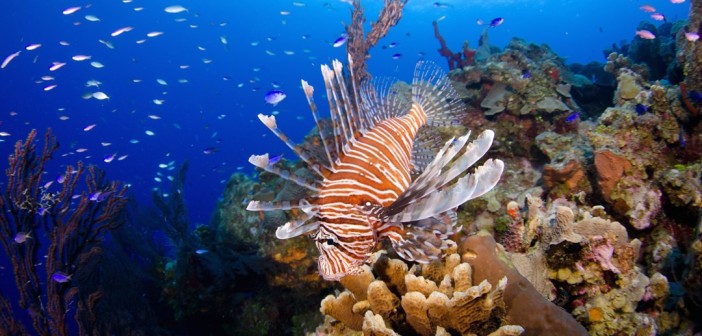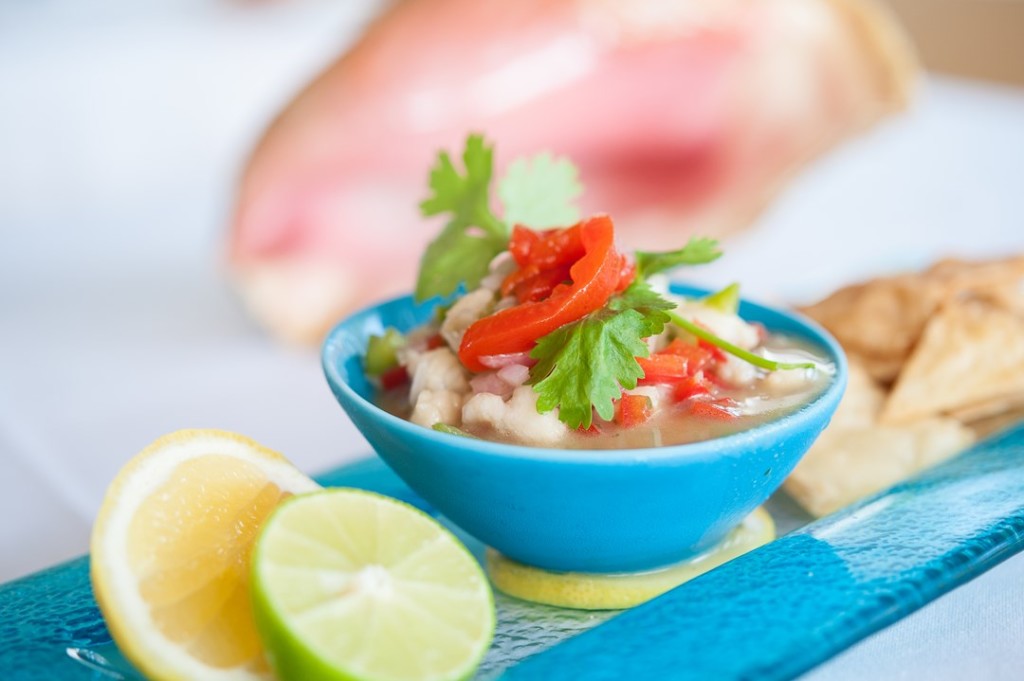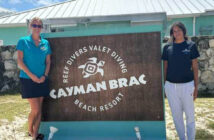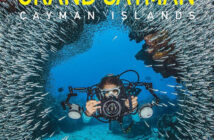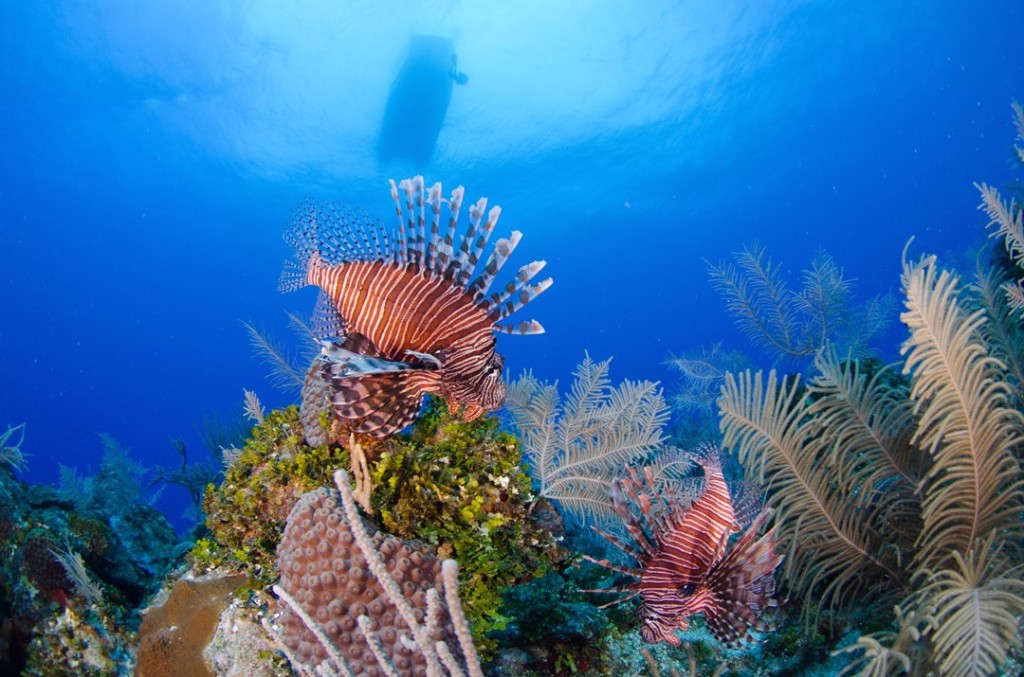
The fish reproduce at a fast rate so culling must be done on a regular basis to keep the predators population in manageable numbers. Photo courtesy Ocean Frontiers.
Steve Broadbelt and his team at Ocean Frontiers have culled 10,000 Lionfish from East End reefs; Chef Ron Hargrave has purchased a total of 6000 pounds of the predators to cook up in delectable local dishes.
“Lionfish are beautiful, resilient and strong – a cool fish – but they are deadly to our reefs and if we don’t stop them something bad is going to happen,” says Matt Russell a divemaster/instructor at Ocean Frontiers who has watched the invasion with deep concern for the marine environment. Russell is a dedicated, educated and skilled warrior in the fight against the Lionfish, consistently culling large numbers on dives – a record 56 Lionfish during a 2-tank dive. He’s also a member of the very exclusive “30 Club” whose members have removed 30 or more Lionfish on a single dive. Matt also teaches customers how to safely and humanely remove the invasive species from the reefs.
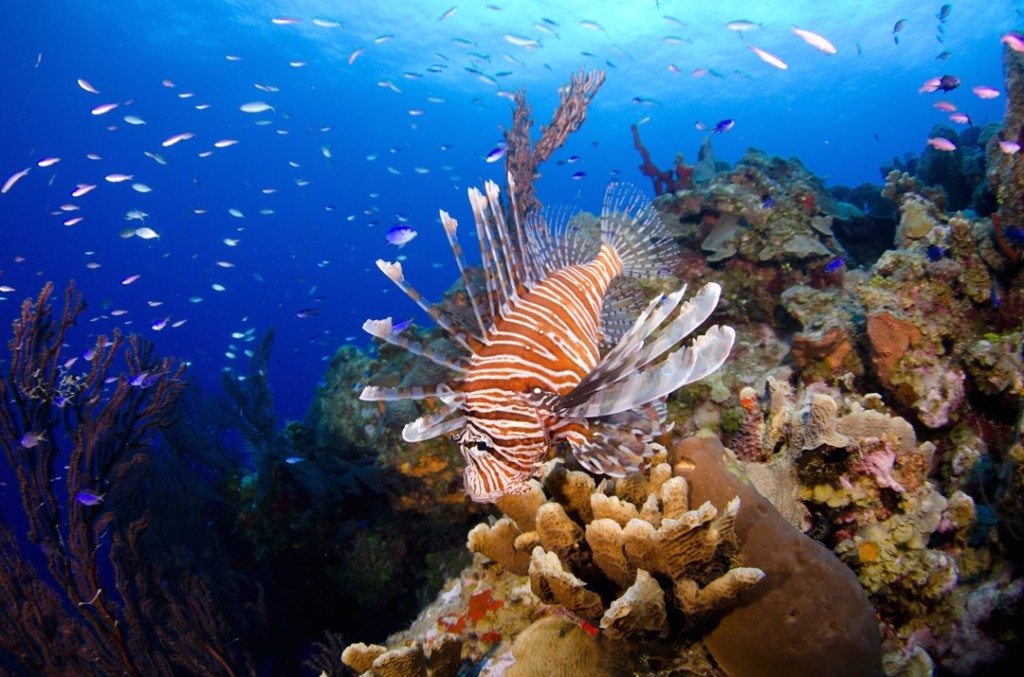
Lionfish are colorful and beautiful, but deadly to Caribbean reef fish because they are voracious eaters. Photo courtesy Ocean Frontiers.
“The hunt was wickedly fun at first, but now I feel an obligation to get as many people involved as I can,” he says. Matt and his co-workers follow the lead set by their boss Steve Broadbelt (also a member of the 30 Club) who is out there hunting and spearing as many Lionfish as he can on company culls. “We’re pretty competitive! Steve ‘gets it’ and understands that we need to keep the pressure on.”
This attitude and the resulting teamwork is why Ocean Frontiers is winning the local battle against invasive Lionfish prowling the reefs at East End, if not the broader war against the predator. Broadbelt and his team aggressively press on, culling as many predators as they can, and encouraging locals and customers to get involved in the fight. In March they crossed an important thresh hold – they have removed 10,000 Lionfish from East End reefs since they began culling three years ago.
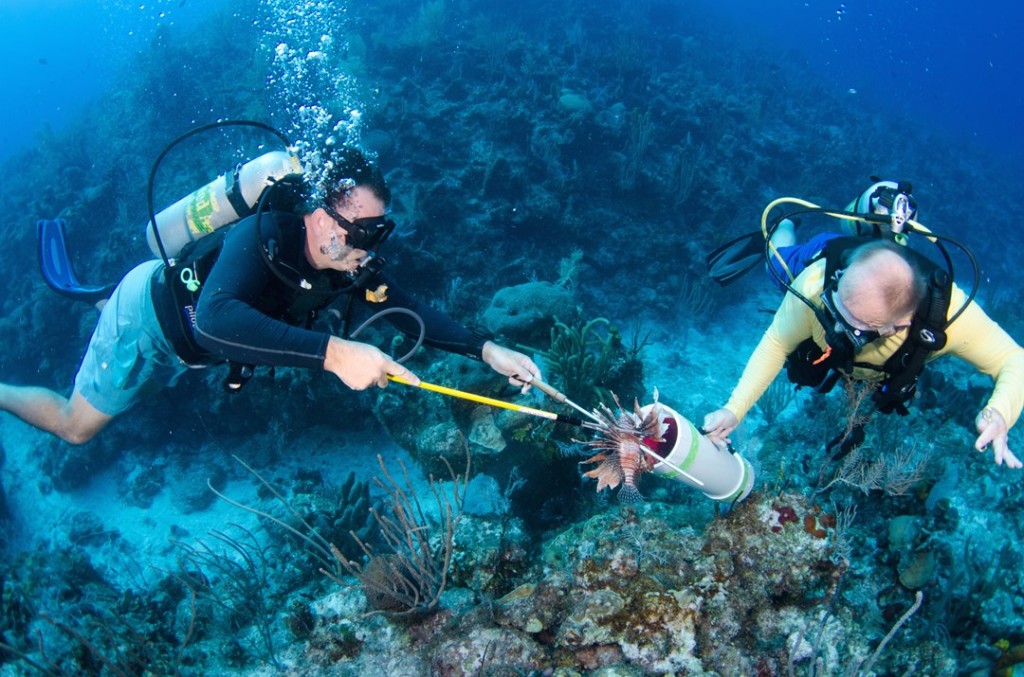
Ocean Frontiers co-owner Steve Broadbelt (left) culling Lionfish during a dive. The fish are speared and placed in a tube for safe handling. Photo courtesy Ocean Frontiers.
Also this month their best customer for the fish, Chef Ron Hargrave, who operates Tukka at East End and Eagle Ray’s Dive Bar & Grill at Compass Point Resort, calculates that he has purchased 6000 pounds of Lionfish at a cost of $25,000. This partnership between Broadbelt and Hargrave is an example of how the community can help fight the Lionfish invasion, and it exemplifies the hope behind the mantra being repeated across the Caribbean: to beat them eat them.
Culling invasive Lionfish is a day in, day out challenge, and while eradicating them completely from Cayman’s reefs is unlikely, Ocean Frontiers is hoping to keep the predator population manageable at East End dive sites. Once a week, Ocean Frontiers runs a one-tank afternoon cull, and customers are asked to help by being Lionfish spotters for trained cullers. This helps keep the Lionfish population low on regular dive sites, but a more aggressive approach is needed for other areas of the reef not regularly dived. Ocean Frontiers also offers an all-day 3-tank cull once a month for Cayman residents who are licensed to use spears and have their own DoE approved spears. The dive operation also offers a culling class, taught by Matt Russell, for customers interested in being trained and licensed to spear Lionfish.
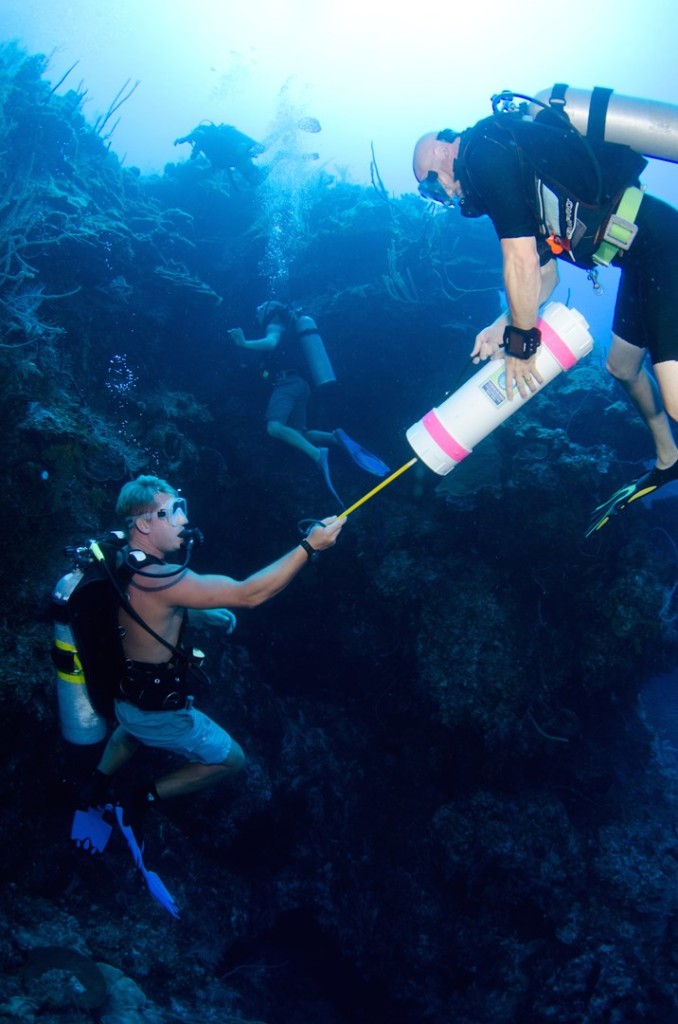
Ocean Frontiers divemaster Matt Russell (lower left) removing invasive Lionfish from a reef at East End, Grand Cayman. Matt has cullled a record 52 Lionfish on a 2-tank dive. Photo courtesy Ocean Frontiers.
“These trips target the hard to reach areas that are too far to get to on a typical half day trip,” says Broadbelt. “We’ve also developed what we call ‘parachute drop culling’ where we split the residents into three teams and drop them off along the reef sequentially the estimated distance apart that they are expected to cover. This enables us to cull over 1 mile of linear reef at a time and has resulted in many top scores. This method can only be used in the right conditions with advanced divers that we are comfortable with… I would class it as an extreme dive, but worth the results.”
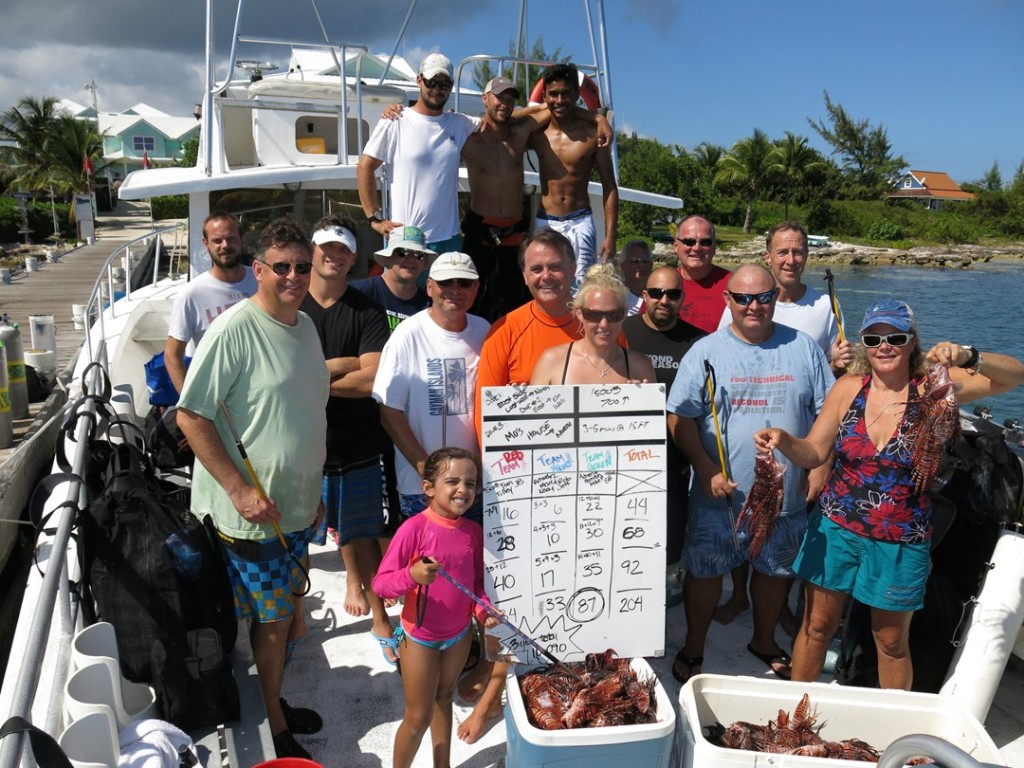
All smiles after a successful cull at East End are Steve Broadbelt and his team at Ocean Frontiers. His daughter in the foreground is too young to spear, but she still wants to be involved in the fight against Lionfish which will certainly involve the next generation. Photo courtesy Ocean Frontiers.
The numbers tell the story: to date Ocean Frontiers has culled a total of 10,202 Lionfish; 1008 divers have participated in culling dives; the most fish ever culled in one day is 320; the most culled by a single diver in one dive is 39; the longest Lionfish caught is approximately 13 inches measured from nose to base of tail; the smallest is about 2 inches. Everything is carefully documented and the results are reported to the Cayman Islands Department of Environment where a Lionfish database is kept.
Chef Ron Hargrave takes all the Lionfish being harvested at East End, no matter the size, and adds them to his menu. He says most of their customers are aware of the issue and support the cause by ordering at least one Lionfish dish – among the most popular are the famous Lionfish Tacos served at Eagle Ray’s Dive Bar & Grill.
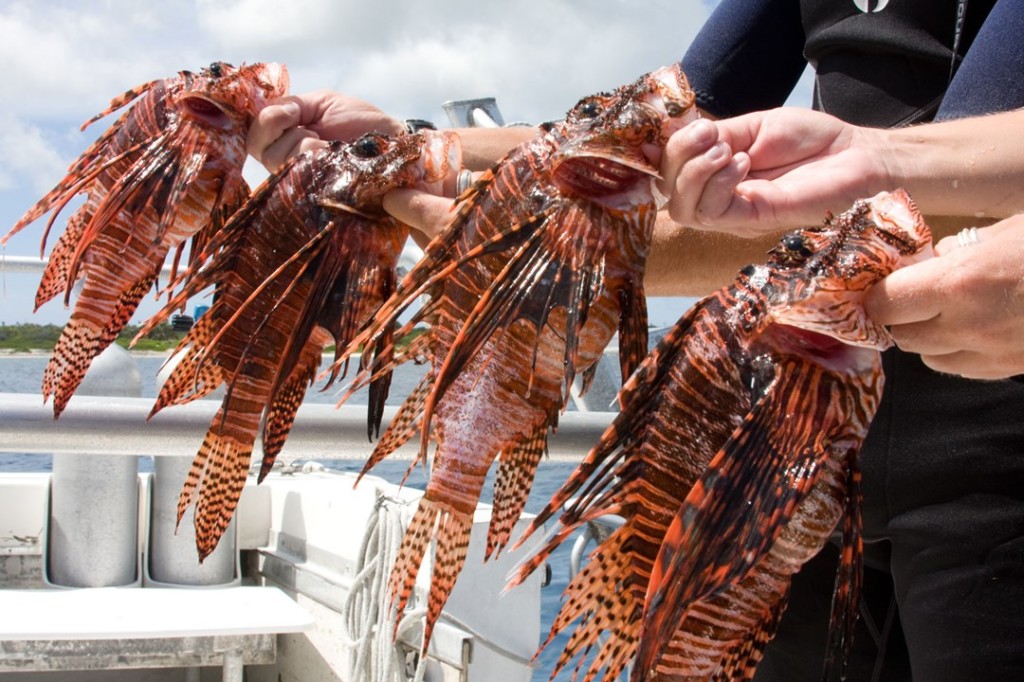
Invasive Lionfish reproduce quickly so culling involves removing predators of all sizes from the reef. Photo courtesy of Ocean Frontiers.
“Customers love it! And why not… Its delicate, flakey, white meat is very mild and extremely tasty,” he says, adding that demand is going up all the time.
“The Lionfish tacos at Eagle Ray’s are probably the best I’ve ever had and they are on the menu 100% of the time,” says Matt Russell who often recommends them. “I’ll ask customers ‘did you try those fish tacos? I caught them!’”
Steve Broadbelt says licensed local cullers joined the fight once they understood the threat posed by the Lionfish, and they continue to be involved.
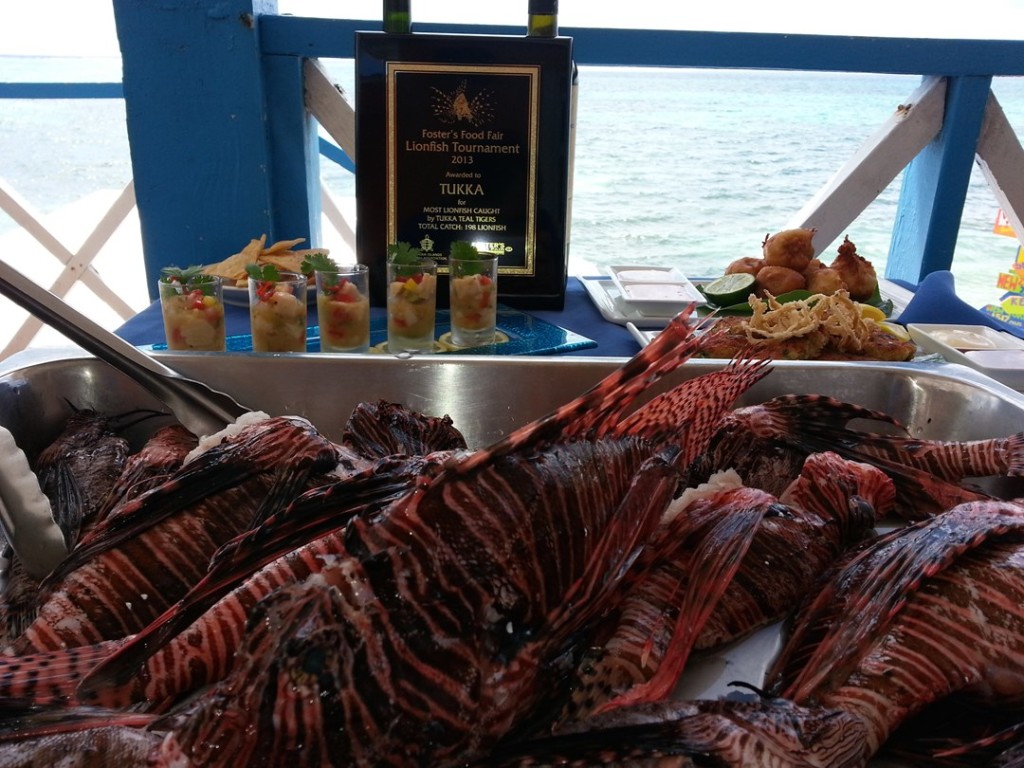
Lionfish on the menu at Tukka and Eagle Ray’s Dive Bar & Grill. The fish have a delicate, flakey white meat that make them good to eat. Photo courtesy Ocean Frontiers.
“Divers do not like harming or killing (culling) marine life, but we have to be smarter than our emotions and understand the damage the Lionfish are doing and the importance of our environmental work,” he says. “We employ some of our own techniques to make sure the Lionfish are terminated as quickly and humanely as possible. There is no reason to make them suffer – they are just not welcome here.”
“You have to take care of the things you love and there are few things I love more than Cayman’s reef life,” says local customer Mark Rovner, a licensed spearer. “At first I was apprehensive about killing fish, but once you understand the horrific damage these invasives can do, you realize there’s no choice. And if not me, who?
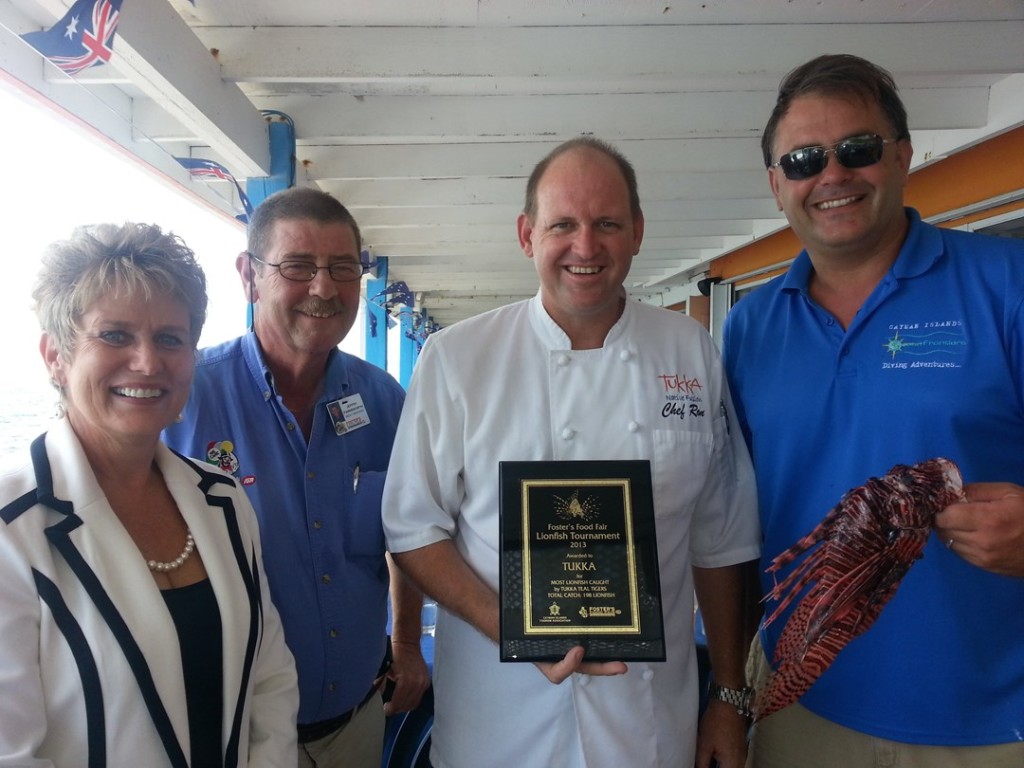
Steve Broadbelt (R)and Chef Ron Hargrave (C) accepting a team award for winning an island-wide Lionfish culling tournament on Earth Day last year. Photo courtesy Ocean Frontiers.
Broadbelt says getting Ocean Frontiers customers involved in culling is easy when they become aware of the threat Lionfish pose and sometimes a little competition keeps the hunt interesting.
“We make the culling trips fun and competitive by encouraging a little rivalry and team spirit,” he says. “Most divers don’t need motivation. They care about the environment and there is always this desire to do a good thing and help with the problem. Some of them just love it and can’t get enough.”
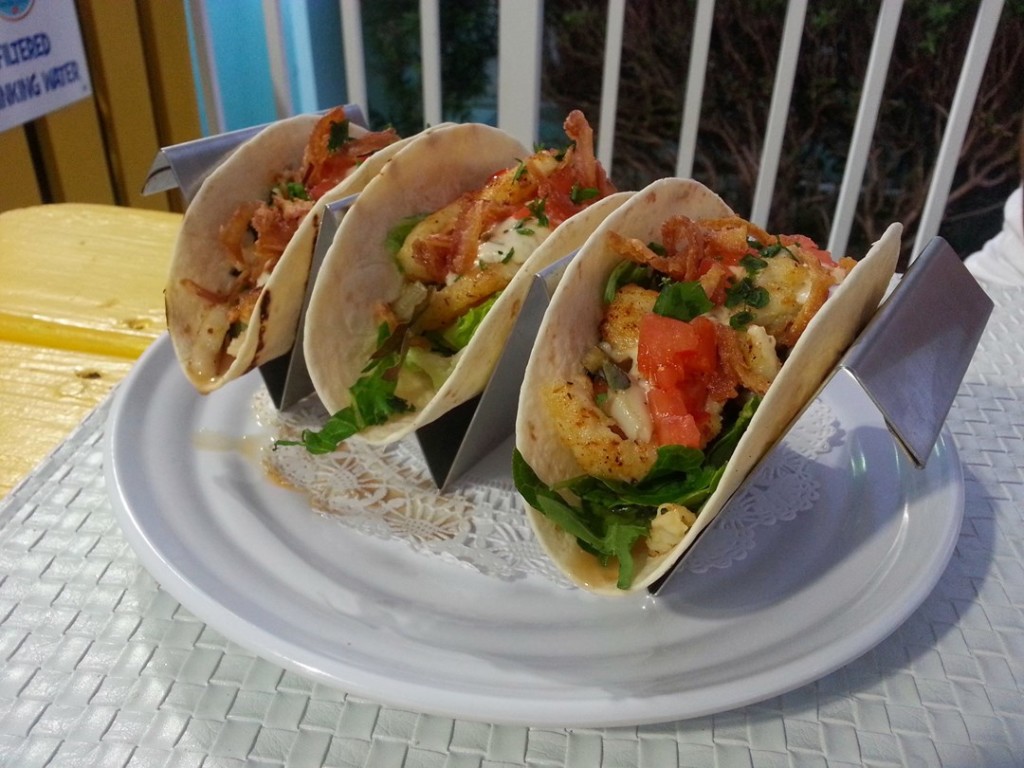
Tasty Lionfish tacos are a popular item on the menu at Eagle Ray’s Dive Bar & Grill at Compass Point Resort, East End. The predators are culled from the reef and purchased by Chef Ron Hargrave who happily prepares them in dishes served to the public. Lionfish has mild, light flakey white meat that is quickly making it a favorite fish for consumers who are happy to help with the fight: to beat them, eat them! Photo courtesy Ocean Frontiers.
Is regular culling it working? Broadbelt says the data they’ve collected and submitted to the Department of Environment indicates that Lionfish counts and sizes are being reduced. Customers are also seeing fewer of them during dives on return trips.
“When I started, the lionfish populated almost every dive site. Now it is a surprise to see a lionfish,” agrees regular customer John Sharp who has participated in culling dives.
“Yes culling is making a difference, but it is like a leaking boat,” says Steve Broadbelt. “Every time we bail out some water… more just keeps coming back in. We can keep bailing and bailing, but we have to find a better long term solution.”
About Ocean Frontiers
Ocean Frontiers Dive Shop is located at Compass Point Dive Resort on the remote East End of Grand Cayman. Founded in 1996 with one dive boat and a dream to introduce divers to the wonders of East End diving, the company has grown into one of Cayman’s premier dive operations with a reputation for catering to small groups and having the island’s friendliest staff. Ocean Frontiers is also recognized as one of the most conservation-minded dive operators in the Cayman Islands with a long history of promoting ocean protection through its company programs, and an unwavering support for outside environmental projects. The winner of Project AWARE’s Environmental Achievement Award in 2004 and 2010, Ocean Frontiers has again been recognized in 2012. The company also received the PADI Green Star Dive Center accreditation in 2012 for demonstrating a dedication to conservation, the first dive operator in the Cayman Islands to receive this distinction.
The Compass Point Dive Resort, which received the Green Globe Certification award in 2010 for sustainable tourism, is the epitome of laidback luxury. It features 28 luxurious one, two and three bedroom oceanfront, ocean view and poolside condominiums, each with its own private patio or balcony and all beautifully decorated with stylish island décor, and fully equipped with all of the comforts of home. Eagle Ray’s Dive Bar and Grill is now open for business at the resort.
For more information:
Call Toll Free: 1.800.348.6096, in Grand Cayman Call: 345.640.7500
E-mail: info@oceanfrontiers.com, Website: www.oceanfrontiers.com
Facebook: www.facebook.com/caymanscubadiving
Twitter: @oceanfontiers
Linkedin: Ocean Frontiers




